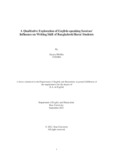| dc.contributor.advisor | Ahmed, Sabreena | |
| dc.contributor.author | Mollika, Sayada | |
| dc.date.accessioned | 2021-12-08T06:09:04Z | |
| dc.date.available | 2021-12-08T06:09:04Z | |
| dc.date.copyright | 2021 | |
| dc.date.issued | 2021-09 | |
| dc.identifier.other | ID 15303001 | |
| dc.identifier.uri | http://hdl.handle.net/10361/15714 | |
| dc.description | This thesis is submitted in partial fulfillment of the requirements for the degree of Bachelor of Arts in English, 2021. | en_US |
| dc.description | Cataloged from PDF version of thesis. | |
| dc.description | Includes bibliographical references (pages 138-165). | |
| dc.description.abstract | This qualitative multiple case study inspected the influence of three rural ESOL learners’ exposure to a series of 12 one-to-one speaking sessions via mobile phone on their speaking skill as well as writing skill. The students were asked to write paragraphs on topics given by the researcher prior to the speaking sessions. While the speaking sessions were assessed by an adapted version of CEFR assessment scales (2001), these written samples were compared with another set of paragraphs that were collected from the participants after the speaking sessions. Both the written samples were assessed by the adapted version of Brown & Bailey’s (1984) “Analytic Scale for Rating Composition Tasks”. In addition, this study aimed to find out the participants’ perspectives towards their experience and the challenges they faced during the study through semi-structured interviews conducted in Bangla. The transcribed interviews were coded for prominent themes through qualitative data analysis. The results revealed that all the participants progressed in terms of spoken interaction ability but not in the case of uttering English sentences independently over the period of two months. With regard to their written paragraphs, the participants’ post-session writing samples showed improvement in terms of content, organisation, and vocabulary choice, than their initial pre-session written samples. Some notable challenges the participants faced during the speaking sessions were difficulty idea generation, organising thoughts, making correct grammatical sentences and choosing vocabulary. The outcome of the study is important for English teachers who may blend speaking and writing skills together in the same class in order to help learners in an ESOL context such as Bangladesh. | en_US |
| dc.description.statementofresponsibility | Sayada Mollika | |
| dc.format.extent | 219 pages | |
| dc.language.iso | en | en_US |
| dc.publisher | Brac University | en_US |
| dc.rights | Brac University theses are protected by copyright. They may be viewed from this source for any purpose, but reproduction or distribution in any format is prohibited without written permission. | |
| dc.subject | Speaking skill | en_US |
| dc.subject | Writing skill | en_US |
| dc.subject | CEFR scales | en_US |
| dc.subject | Rural students | en_US |
| dc.subject | ESOL/ESL/EFL | en_US |
| dc.subject.lcsh | English language--Study and teaching--Foreign speakers | |
| dc.title | A qualitative exploration of English-speaking sessions’ influence on writing skill of Bangladeshi rural students | en_US |
| dc.type | Thesis | en_US |
| dc.contributor.department | Department of English and Humanities, Brac University | |
| dc.description.degree | B.A. in English | |

